Navigating the Martech Landscape
Insights from our proprietary survey
If you’ve ever been tasked with searching for a new platform or vendor for your company, you know the marketing technology (“martech,” if you want to sound cooler) landscape is far from straightforward. Thousands of different vendors and platform options have led to fragmentation.
It’s great to have choices, but we could all use a little guidance when making selections. Finding your perfect platform has become akin to finding a TikTok video you saw on your for you page three weeks ago and forgot to add to your likes - where do you even begin?
Fear not. The t::team has officially wrapped up and analyzed the results of our proprietary survey, designed to uncover the state of martech stacks and give an overview of the landscape. These findings have been analyzed by marketers, for marketers, designed to help you understand what’s out there, what’s popular and what the future may hold.
The survey showcases a diverse response set across various sectors, predominantly from the middle market segment. Industries varied across 11 categories. More than 20% of respondents work in manufacturing, followed by automotive and professional services. The average company size was 101-500 people, with the average team size was around 10 people.
Now that you know who we heard from, let’s get to the good stuff.
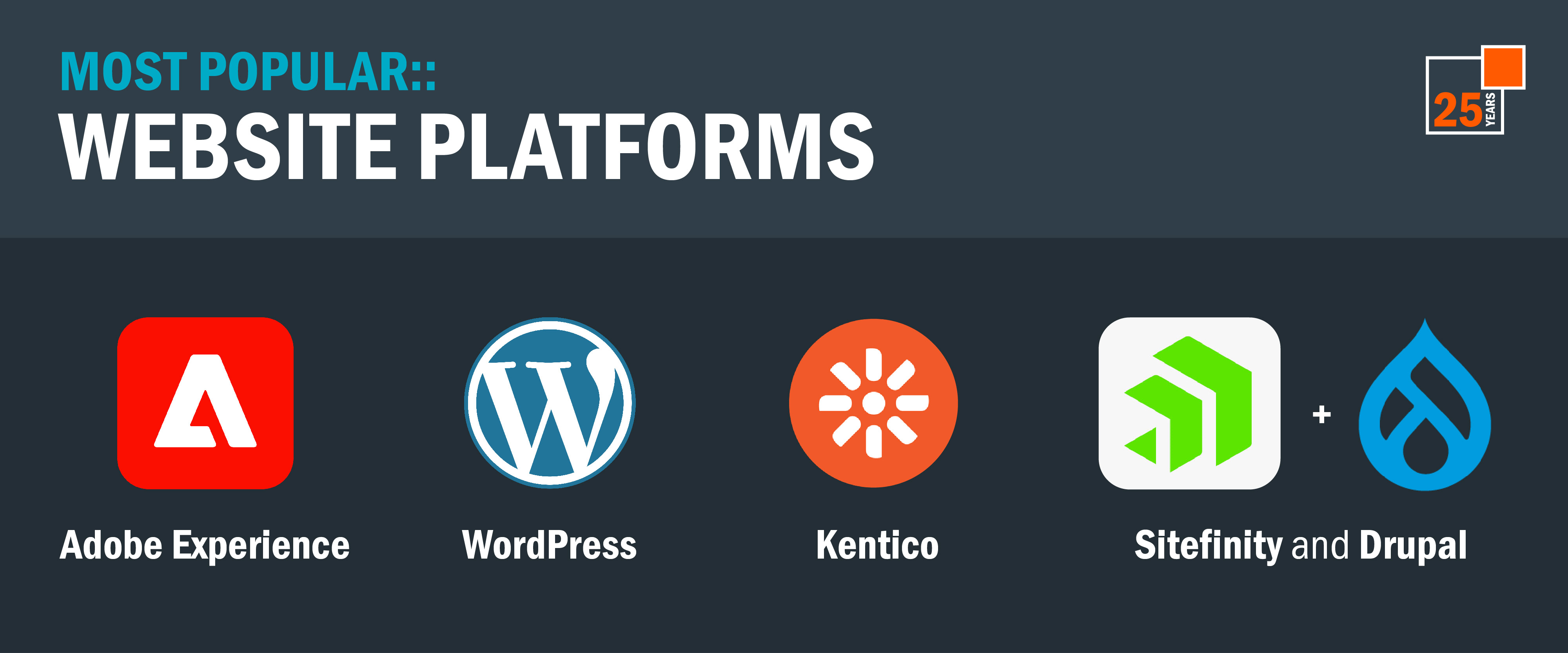
The survey highlights some serious diversity in platform usage, with Adobe Experience, WordPress and Kentico leading the pack, followed closely by Sitefinity and Drupal (which were basically tied).
Next, the most popular email marketing platforms: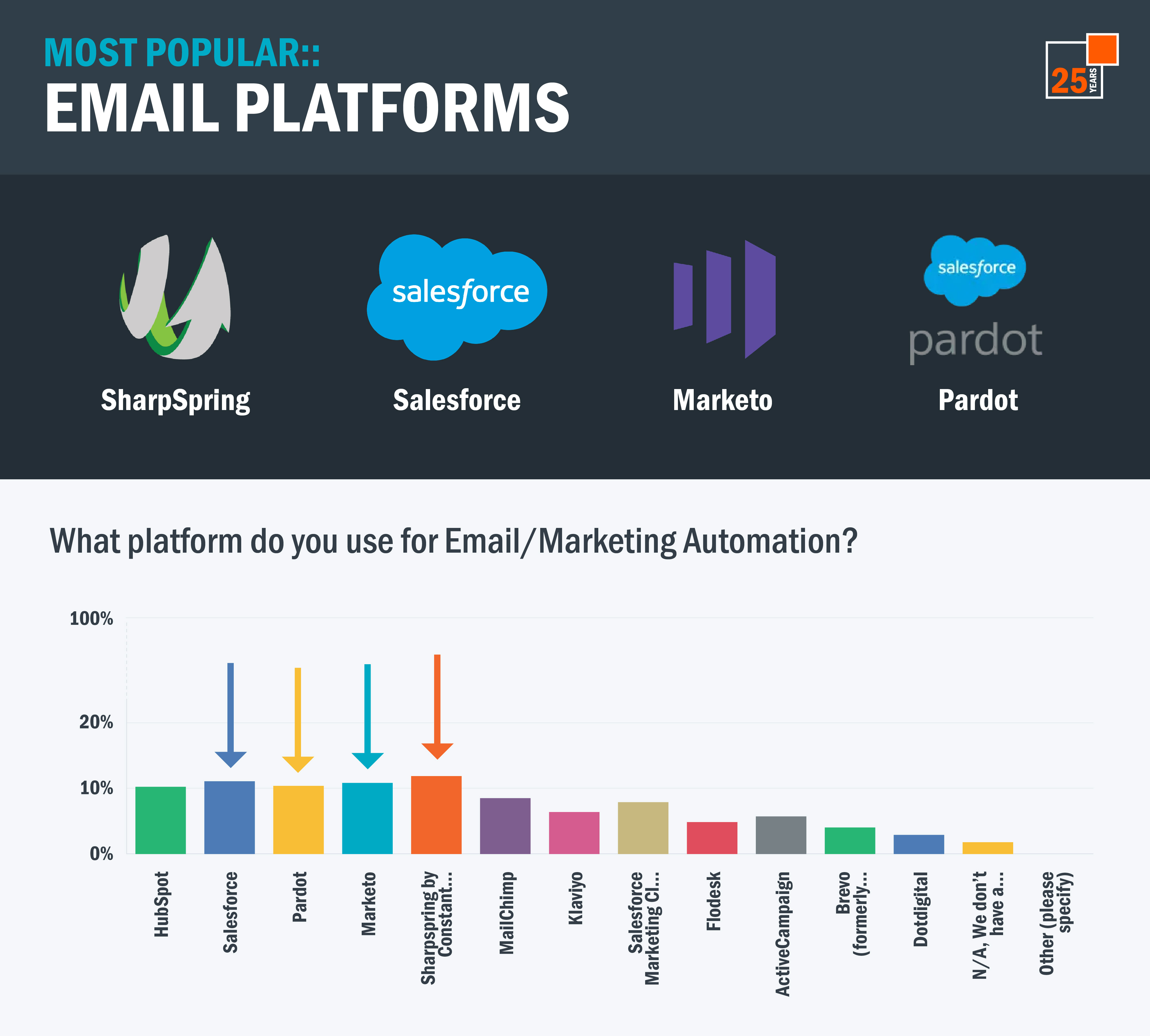
Interestingly, the top platform is considerably less robust than the second, third and fourth, which offer more features. The next most-used platforms, MailChimp and HubSpot, are similar to SharpSpring in terms of features and user experience, showcasing a fairly even split as to what middle-market companies value in their email marketing software.
Finally, the most popular CRM platforms. Answers to this question were the most wide-ranging and varied: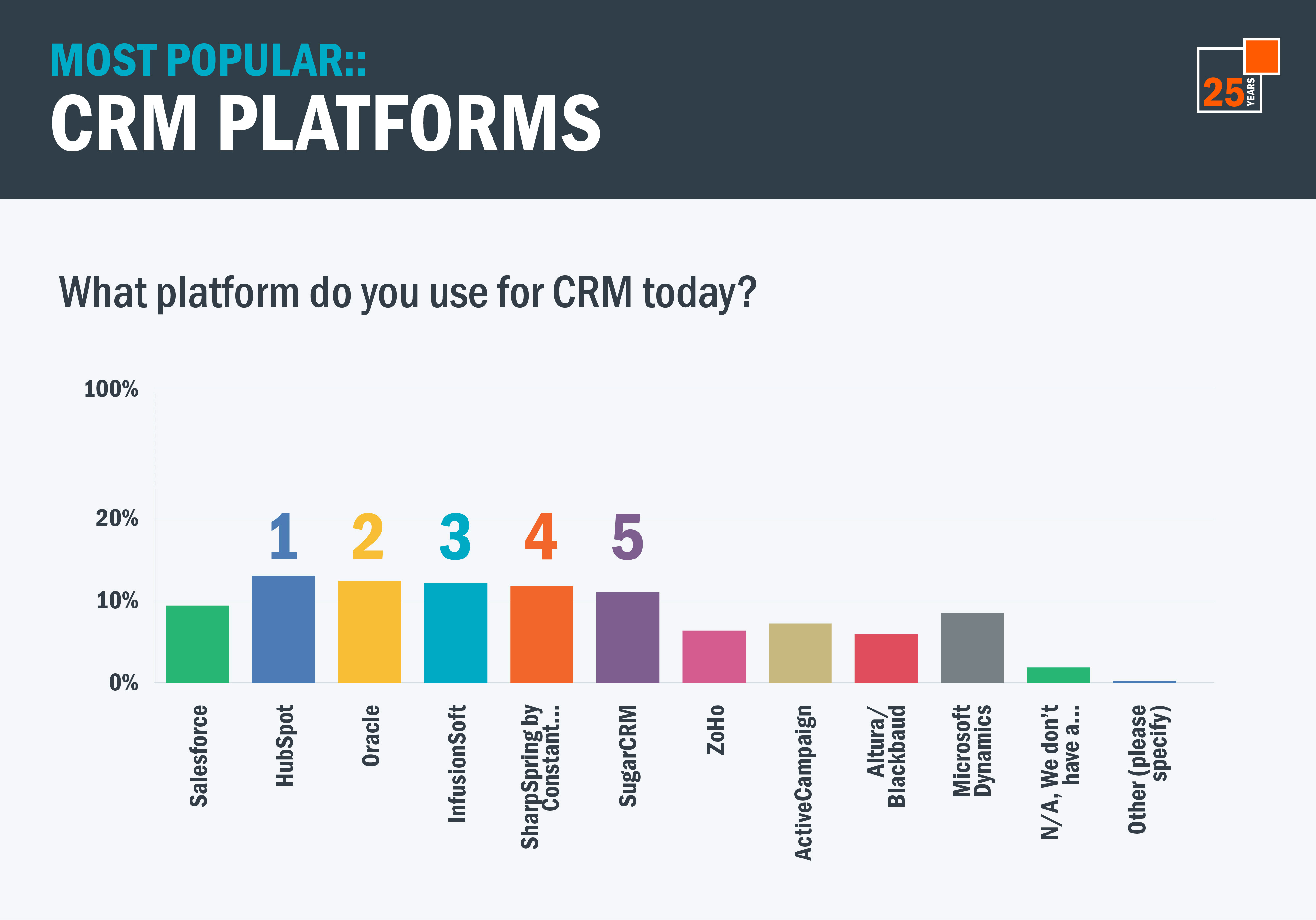
We weren’t shocked to see HubSpot ranked #1. It’s a consistent platform with robust customer support and multiple options that cater to both marketers dipping their toes into the world of CRMs and those looking for more advanced options.
However, it was surprising to see SharpSpring rank high in the fourth spot. This is likely tied to SharpSpring’s use as an email platform. It’s convenient to integrate platforms from the same platform to both manage and contact customers.
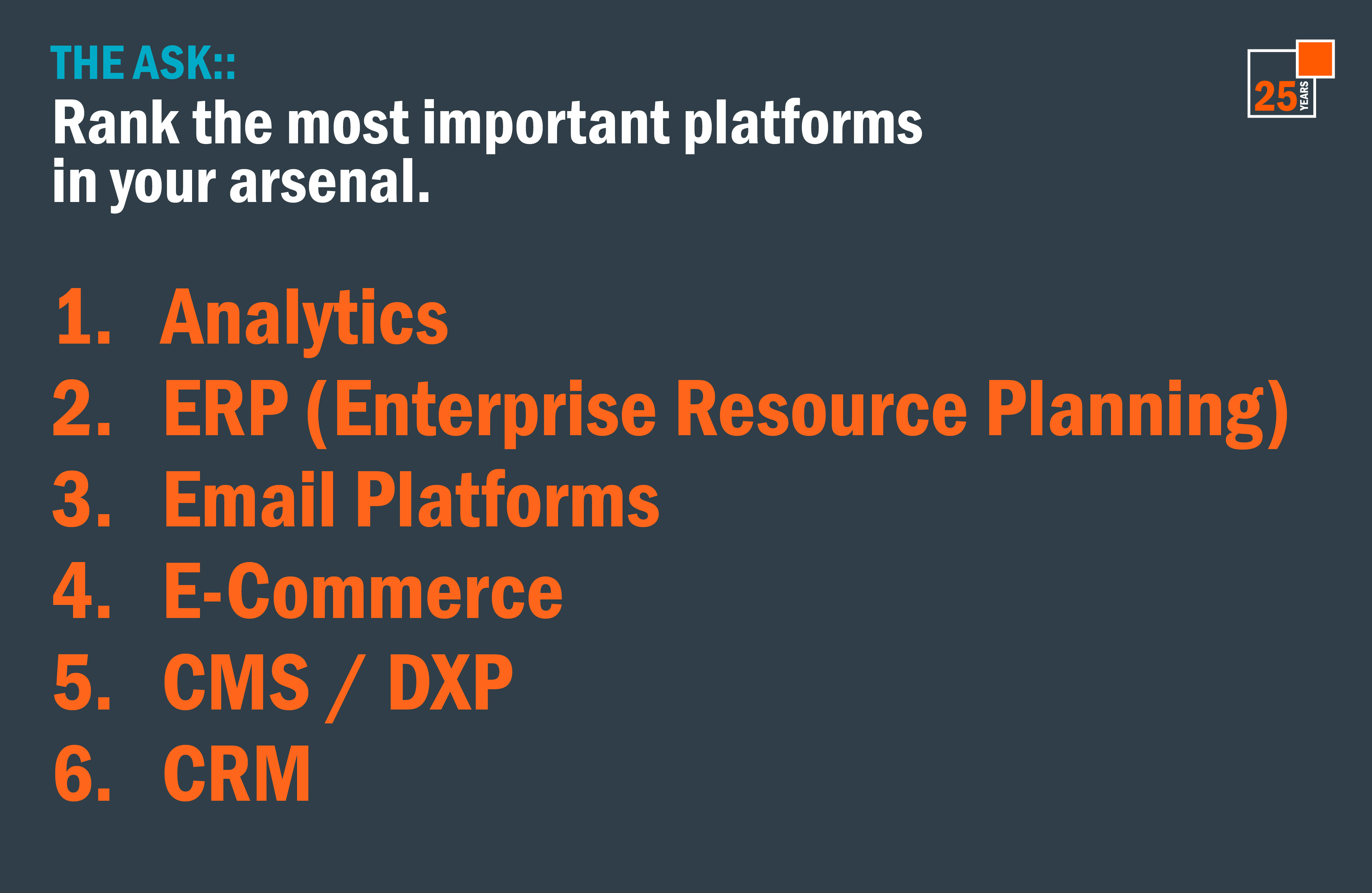
This is an intriguing insight into the importance of analytics and ERP systems, surprisingly overshadowing CRM/CMS systems in some respects. Cards on the table - we at thunder::tech were definitely expecting a CRM/CMS platform to rank higher in the list. But it’s possible a good platform that works well tends to stay out of sight, out of mind.
Meanwhile, analytics is constantly changing and needs tweaks, checks and new reports. Users appear to value a clear picture of site performance more than anything else. In the context of martech stacks, this makes sense. If one platform is underperforming, the analytics will likely reflect this.
Another insight: We also asked respondents which platforms are underperforming the most or could use improvement. In comparison to the previous question, this one ranked CMS as number one.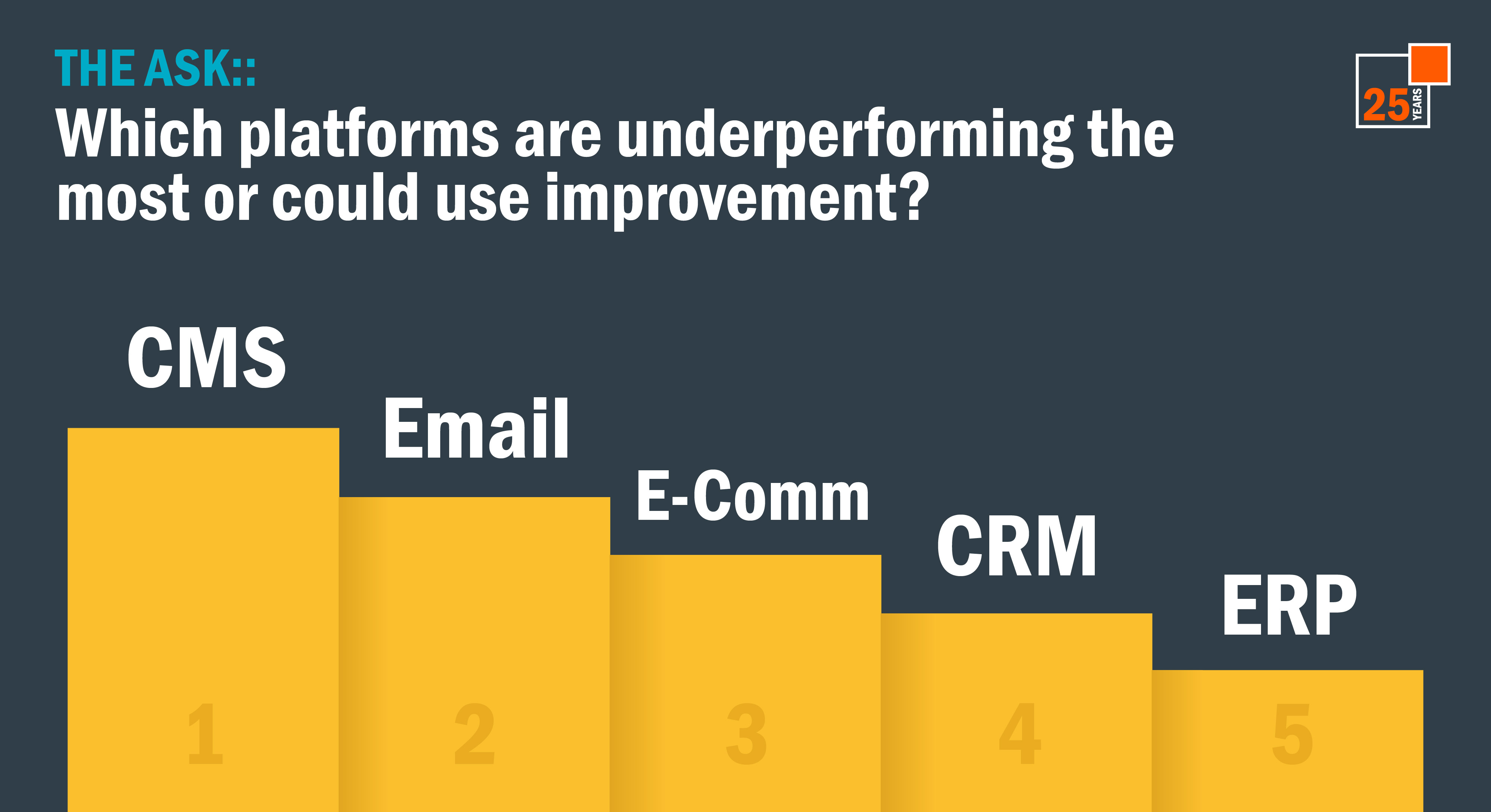
These survey results show CMS is the least important platform for most teams but also the most underutilized.
First, we asked how many respondents use A/B testing to optimize their email communications. The majority (66%) said they run a test at least occasionally, if not more often. Only 5% admitted to not A/B testing at all. Clearly, robust A/B testing is key for most people in search of an email delivery service.
Second, we asked about the use of automation features and received an even more positive response. Around 70% of businesses run automated email campaigns at least occasionally, while less than 10% said they have never set up automation.
Most cited a website redesign as the number one reason to change things up, followed by a lack of features in their current platform, followed by price. This implies a CMS’s quality and ability to meet a business’s needs outweighs price.
When making decisions within the purchasing process, the majority of respondents prefer to consult the platform manufacturer’s site. Results showed the most valued sources of information as: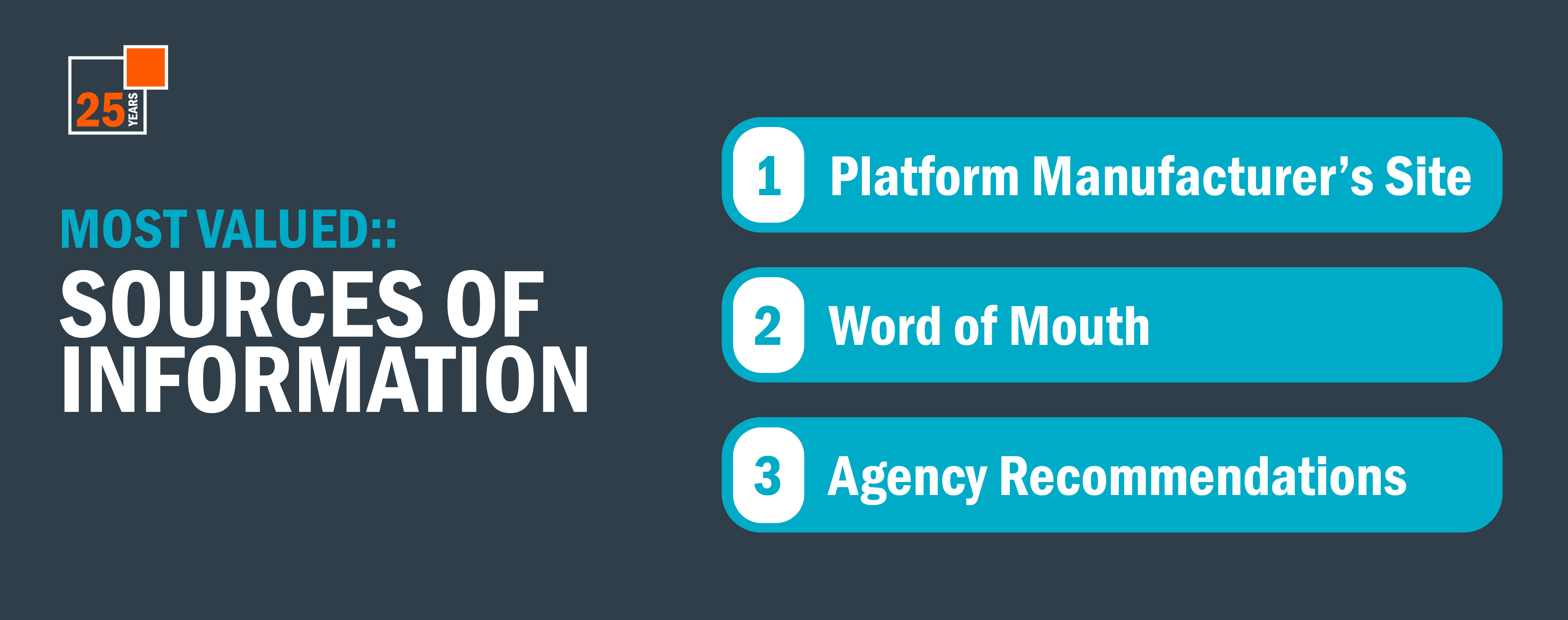
The most important factors taken into consideration during the selection process are: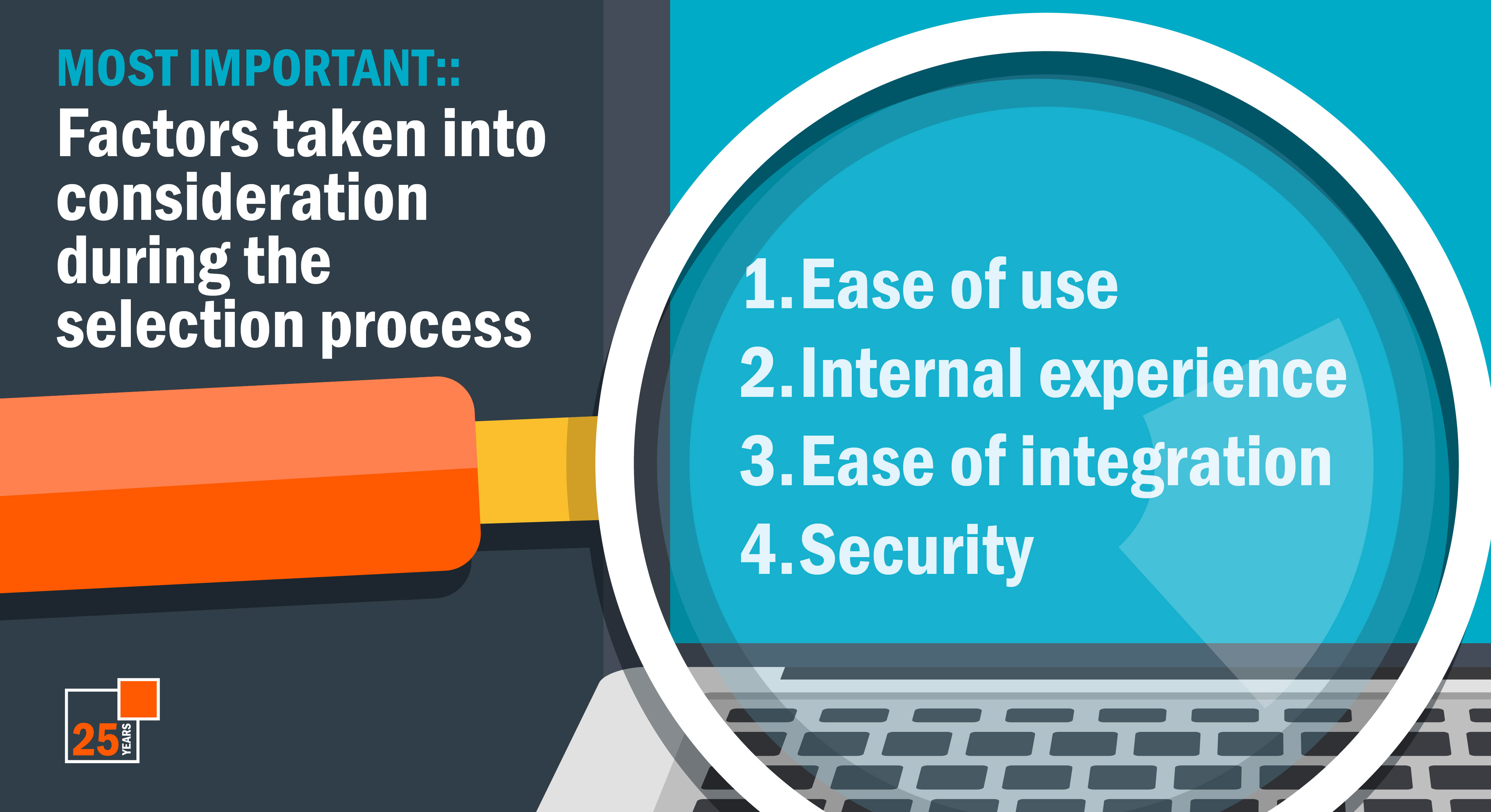
This tracks. Change isn’t always the easiest thing, especially when it’s rolled out to an entire team. If a platform requires hours of training to use basic features (and a lifetime to master the more advanced ones), it’s unlikely the average employee will warm up to using it regularly. Choosing a new CMS is a big deal, and teams generally want the change to stick.
Most respondents have budgets between $10K and $100K. Less than 20% reported a budget outside this range. However, this is subject to change. The supermajority of respondents believe that costs are going to climb, and their budgets will have to keep up.
And hey, with agency recommendations being the number three most trusted source of information on this topic, maybe we can help you out along the way. Contact us if you want a casual chat on email marketing platforms or an in-depth discussion on the latest CMS platform updates. We’re down for either.
It’s great to have choices, but we could all use a little guidance when making selections. Finding your perfect platform has become akin to finding a TikTok video you saw on your for you page three weeks ago and forgot to add to your likes - where do you even begin?
Fear not. The t::team has officially wrapped up and analyzed the results of our proprietary survey, designed to uncover the state of martech stacks and give an overview of the landscape. These findings have been analyzed by marketers, for marketers, designed to help you understand what’s out there, what’s popular and what the future may hold.
What kind of survey?
Our comprehensive survey garnered responses from more than 1,000 people (thanks, everyone!) who shared their preferences and perspectives on tech stacks and platforms. Of these 1,000+, most worked in the middle market segment and identified as managers. Half of the responses came from members of either the Marketing / IT Department. The other half was a combination of finance, sales, operations and HR personnel.The survey showcases a diverse response set across various sectors, predominantly from the middle market segment. Industries varied across 11 categories. More than 20% of respondents work in manufacturing, followed by automotive and professional services. The average company size was 101-500 people, with the average team size was around 10 people.
Now that you know who we heard from, let’s get to the good stuff.
The results
Drumroll, please! It’s time for a deep dive into the survey findings to better understand their implications for the current state and future of digital marketing.The top performers overall
This isn't the Oscars. We’re giving you Best Picture right up front, starting with website platforms. Out of the 13 most popular CMS/DXP/e-commerce platforms, respondents selected the following as their most used:- Adobe Experience
- WordPress
- Kentico
- Sitefinity and Drupal

The survey highlights some serious diversity in platform usage, with Adobe Experience, WordPress and Kentico leading the pack, followed closely by Sitefinity and Drupal (which were basically tied).
Next, the most popular email marketing platforms:
- SharpSpring
- Salesforce
- Marketo
- Pardot

Interestingly, the top platform is considerably less robust than the second, third and fourth, which offer more features. The next most-used platforms, MailChimp and HubSpot, are similar to SharpSpring in terms of features and user experience, showcasing a fairly even split as to what middle-market companies value in their email marketing software.
Finally, the most popular CRM platforms. Answers to this question were the most wide-ranging and varied:
- HubSpot
- Oracle
- InfusionSoft
- SharpSpring
- SugarCRM

We weren’t shocked to see HubSpot ranked #1. It’s a consistent platform with robust customer support and multiple options that cater to both marketers dipping their toes into the world of CRMs and those looking for more advanced options.
However, it was surprising to see SharpSpring rank high in the fourth spot. This is likely tied to SharpSpring’s use as an email platform. It’s convenient to integrate platforms from the same platform to both manage and contact customers.
Further insights into platform use
Here’s where it gets interesting. First, we asked respondents to rank the most important platforms in their arsenal. The results:- Analytics
- ERP (Enterprise resource planning)
- Email platforms
- E-Commerce
- CMS / DXP
- CRM

This is an intriguing insight into the importance of analytics and ERP systems, surprisingly overshadowing CRM/CMS systems in some respects. Cards on the table - we at thunder::tech were definitely expecting a CRM/CMS platform to rank higher in the list. But it’s possible a good platform that works well tends to stay out of sight, out of mind.
Meanwhile, analytics is constantly changing and needs tweaks, checks and new reports. Users appear to value a clear picture of site performance more than anything else. In the context of martech stacks, this makes sense. If one platform is underperforming, the analytics will likely reflect this.
Another insight: We also asked respondents which platforms are underperforming the most or could use improvement. In comparison to the previous question, this one ranked CMS as number one.
- CMS
- E-Commerce
- CRM
- ERP

These survey results show CMS is the least important platform for most teams but also the most underutilized.
Email marketing insights
We descended down further to ask some more in-depth questions about email marketing, specifically how respondents use the features within their email marketing platforms.First, we asked how many respondents use A/B testing to optimize their email communications. The majority (66%) said they run a test at least occasionally, if not more often. Only 5% admitted to not A/B testing at all. Clearly, robust A/B testing is key for most people in search of an email delivery service.
Second, we asked about the use of automation features and received an even more positive response. Around 70% of businesses run automated email campaigns at least occasionally, while less than 10% said they have never set up automation.
CMS purchasing decisions
Growing businesses are never comfortable staying still. More than 65% of respondents said they were looking to transition to a new CMS/DXP/e-commerce platform in the next 12 months.Most cited a website redesign as the number one reason to change things up, followed by a lack of features in their current platform, followed by price. This implies a CMS’s quality and ability to meet a business’s needs outweighs price.
When making decisions within the purchasing process, the majority of respondents prefer to consult the platform manufacturer’s site. Results showed the most valued sources of information as:
- Platform manufacturer’s site
- Word of mouth
- Agency recommendations

The most important factors taken into consideration during the selection process are:
- Ease of use
- Internal experience
- Ease of integration
- Security

This tracks. Change isn’t always the easiest thing, especially when it’s rolled out to an entire team. If a platform requires hours of training to use basic features (and a lifetime to master the more advanced ones), it’s unlikely the average employee will warm up to using it regularly. Choosing a new CMS is a big deal, and teams generally want the change to stick.
CMS budgeting
Finally, we asked respondents to provide insights on their budgeting strategies when selecting and maintaining a CMS. Results showed the average CMS budget fell between $25K and $50K.Most respondents have budgets between $10K and $100K. Less than 20% reported a budget outside this range. However, this is subject to change. The supermajority of respondents believe that costs are going to climb, and their budgets will have to keep up.
The state of your martech stack
Has your website been underperforming lately? Is there just something you wish you could change about your email platform? Ideally, these survey results provide a few helpful insights or starting points for you to evaluate your own marketing technology stack. Plus, download our latest edition of Marketing Trends for a full breakdown on all things martech.And hey, with agency recommendations being the number three most trusted source of information on this topic, maybe we can help you out along the way. Contact us if you want a casual chat on email marketing platforms or an in-depth discussion on the latest CMS platform updates. We’re down for either.